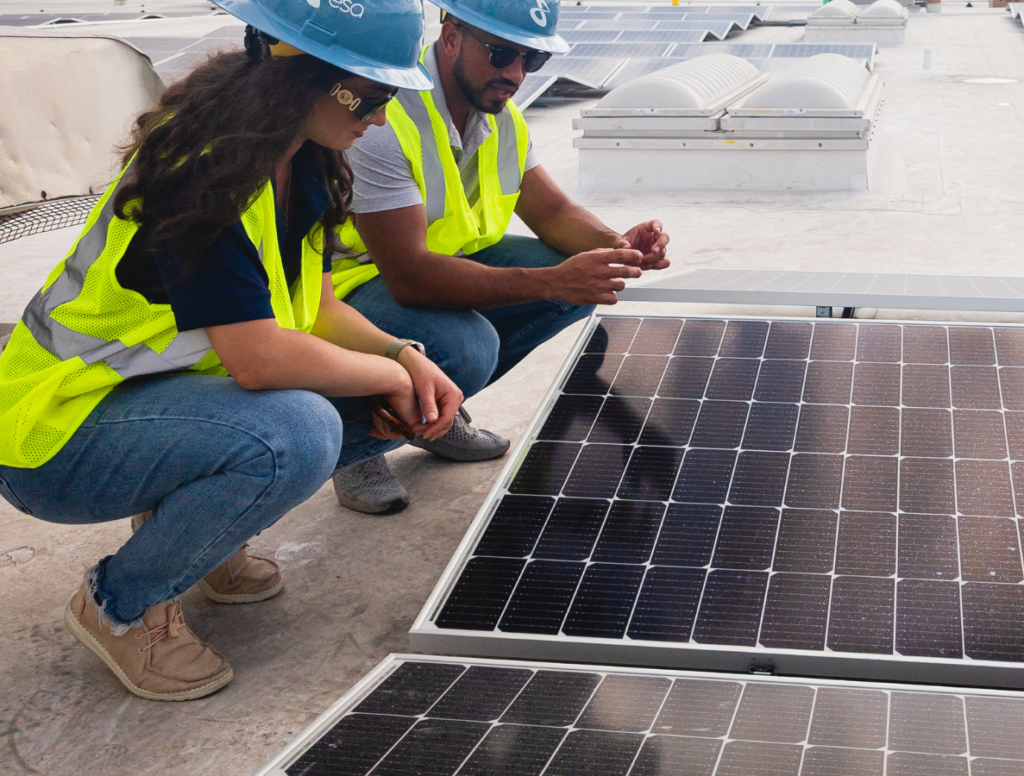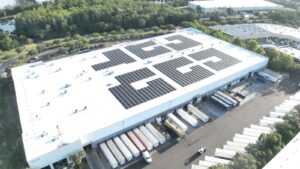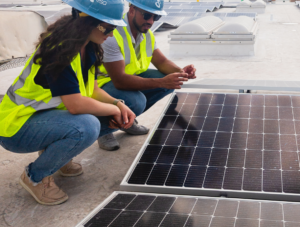Every business owner has basic questions about why they should invest in commercial solar energy. Here are some of the most common commercial solar faqs.
What are Solar Photovoltaic Cells and how do they work?
The word photovoltaic comes from the Greek words: photo,’phos,’ meaning light, and ‘volt’, which refers to electricity. Photovoltaic (PV) means light-electricity, which perfectly describes the process of converting light into electricity with solar photovoltaic cells.
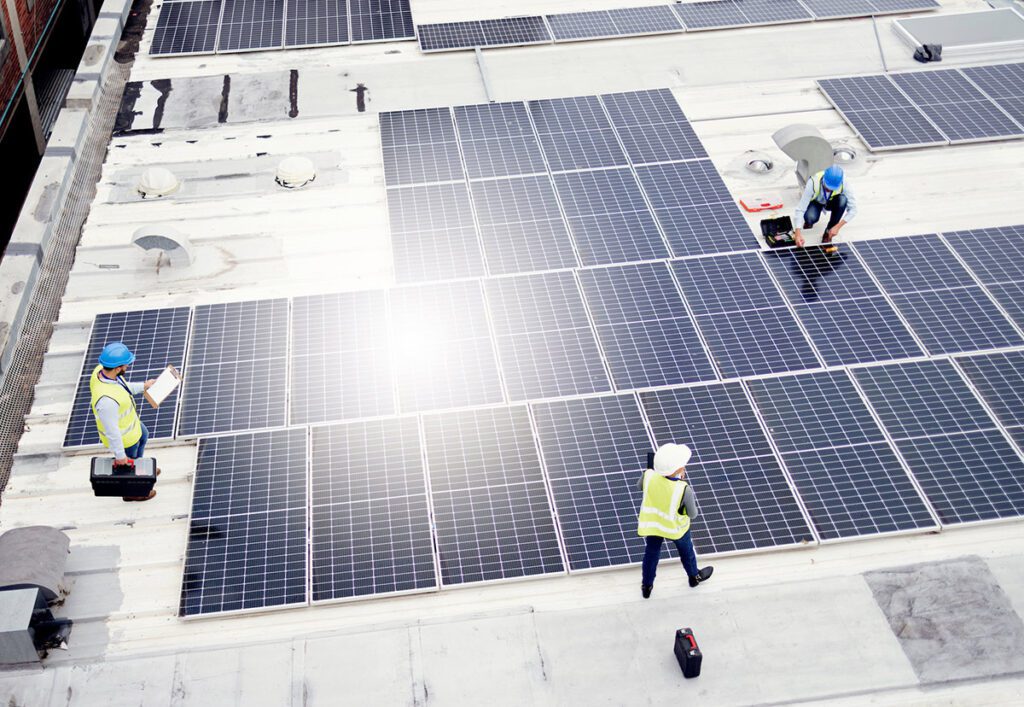
Solar cells are constructed from materials capable of absorbing energy from the sun, specifically in the form of photons, and transforming these photons into electricity, essentially turning photons into electrons. When sunlight hits a solar cell, the photovoltaic (PV) material within the panel absorbs this energy. This absorption generates electrical charges that move and result in the flow of electricity through the panels.
Why should my business consider commercial solar?
Adopting commercial solar energy can lead to a decrease in operational costs and provide several financial benefits, including tax credits and a notable return on investment.
The Solar Energy Industries Association has documented that businesses utilizing commercial solar systems generally observe a 50% reduction in their electricity expenses, with some cases reporting decreases of 80-90%.
The installation of solar energy systems has been associated with an average increase in property value of about 10%.
These findings highlight the practical advantages of integrating solar energy into business operations for business owners considering such investments for long-term energy solutions.
Check out our blog post: “How does solar benefit commercial buildings?” to learn more about why your business should invest in solar energy!
What does commercial solar installation consist of?
Switching to commercial solar systems is increasingly recognized as an effective strategy for businesses to minimize their environmental impact. This shift represents a commitment to sustainable energy practices. Initially, the process entails a consultation with a team specializing in solar panel installation.
During this consultation, the team evaluates the company’s energy needs and devises a tailor-made system to address those requirements. Following the approval of the system design, the installation phase begins. This typically includes mounting panels to the commercial building’s rooftop and integrating them with the existing electrical infrastructure. Many businesses witness a return on their investment in solar technology within a few years following installation.
Investing in solar energy not only helps reduce dependence on fossil fuels but also cuts down on carbon emissions. This transition not only serves environmental purposes but also grants businesses greater control over their energy usage and expenses.
Many firms specializing in commercial solar installations provide continuous monitoring and maintenance services. These services ensure the solar system maintains its efficiency and energy production capabilities over time.
Given the pressing challenges posed by climate change, the decision to embrace solar energy reflects a business’s dedication to sustainability.
What are the financial benefits of solar energy?
Clean energy offers numerous financial advantages.
Significant Reduction in Electricity Bills
One of the most immediate benefits of solar energy is the significant reduction in electricity bills. By generating your own electricity, you rely less on the grid, which directly translates to lower monthly energy costs. Over time, the savings can cover the initial investment in solar panel installation.
Increased Property Value
Properties equipped with solar energy systems often see an increase in value. Studies have shown that commercial properties with solar installations sell at a premium compared to those without. This is due to the prospective savings on energy bills and the growing consumer preference for sustainable energy solutions.
Access to Incentives and Rebates
Governments and local authorities frequently offer incentives, rebates, and tax credits to encourage the adoption of solar energy. These financial incentives can significantly offset the installation costs and accelerate the return on investment. Business owners and homeowners should explore available local, state, and federal incentives.
Protection Against Rising Energy Costs
Renewable energy can protect against the unpredictable rise of energy prices. By generating your own power, you become less affected by the fluctuations in utility rates, ensuring more predictable expenses. This is particularly advantageous for businesses that require budget stability.
Low Maintenance Costs
Solar energy systems are renowned for their durability and low maintenance requirements. After the initial installation, the ongoing costs to maintain solar panels are minimal, ensuring that the savings from reduced energy bills are not offset by high upkeep expenses.
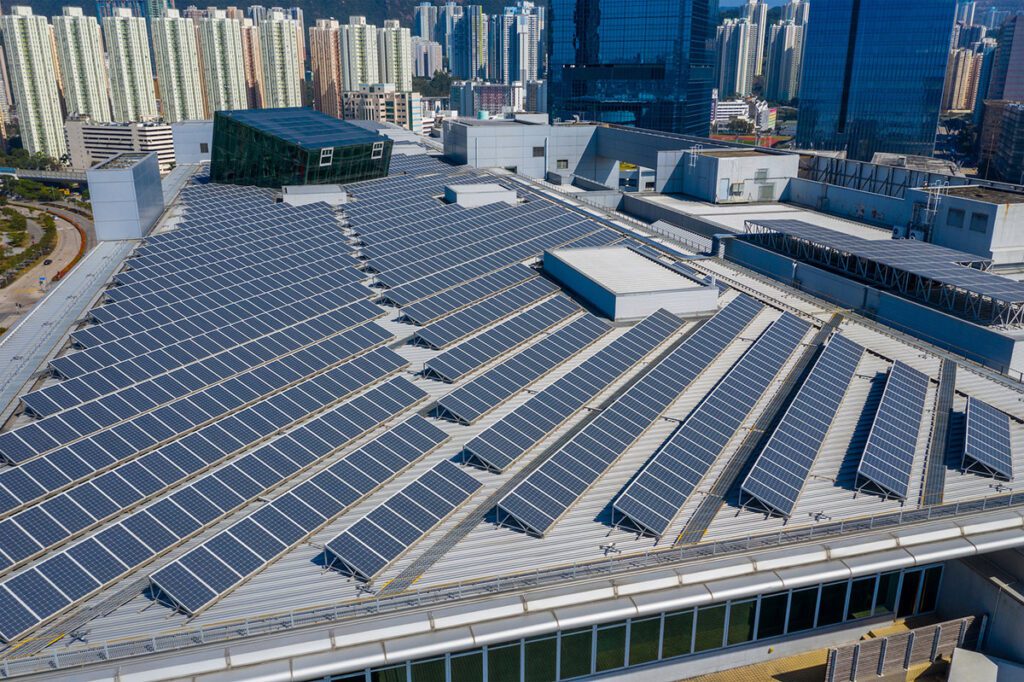
What are the environmental benefits of commercial solar?
Solar energy is a renewable source of power and it has a vital role in reducing greenhouse gas emissions and mitigation of climate change. This is crucial to protecting humans, wildlife, and our ecosystems. Solar energy improves air quality and reduces water use from energy production. It’s a win-win situation for everyone!
Do commercial solar panels produce power when the sun is not shining?
Solar panels are capable of generating electricity in the winter months as efficiently as they do in the summer. It’s important to note that if the panels are obscured by thick layers of snow, their ability to produce energy will be compromised. However, light layers of snow will not be a hindrance, and because the solar panels are installed with a vertical slant, the snow will easily melt and slide right off.
Installation experts often suggest incorporating features such as snow guards to protect the panels from being overwhelmed by ice and snow. Even in conditions of heavy rain or thick cloud cover, sunlight continues to reach the panels, enabling them to generate electricity.
Additionally, rain serves a beneficial role in maintaining the efficiency of solar panels by cleaning off any accumulated dust or dirt.
How much maintenance is required?
When properly installed, solar panels are built to endure up to 30 years, requiring little to no maintenance.
The maintenance demands for solar panels are minimal. A bi-annual cleaning is generally sufficient, provided the panels are not exposed to severe weather conditions.
Professional cleaning services for solar panels can be obtained for a few hundred dollars, ensuring they remain in optimal condition.
The likelihood of needing repairs or replacements for your solar panels is low, so there’s minimal concern regarding their upkeep.
